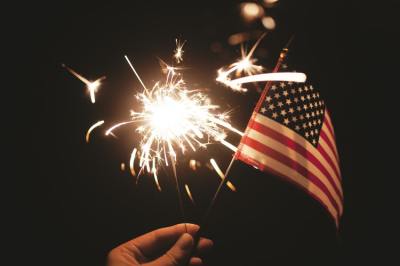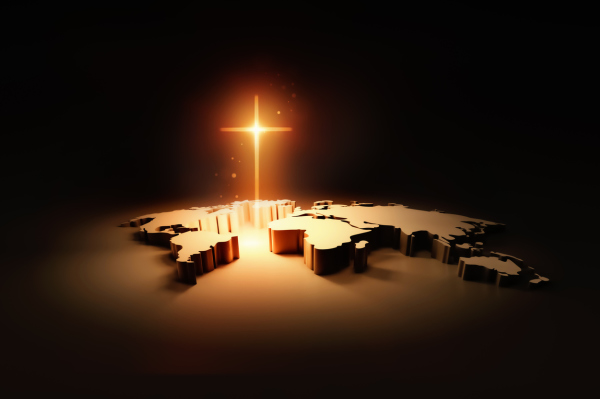What did we celebrate on the Fourth?

The last traces of fireworks have faded from the skies, barbecue pits are full of ash, and Stars and Stripes in many places re-furled.
July 4, 2022 has come and gone.
There are also questions left smoldering: What did we celebrate? What was the nation heralded in the minds of celebrants? One study showed that only 38 percent of Americans are proud of their country—a historic low.[1]
What did we celebrate on July 4, 2022?
Many no doubt celebrated the country wrought through the deliberations and Declaration that came into existence on July 4, 1776, in Philadelphia. However, there is now a large swath of Americans who, unwittingly, many intentionally, find more to celebrate in what happened in France in 1789.
The leaders assembled in Philadelphia in 1776 gave the world a vision for a new kind of nation-state as modeled in the Declaration of Independence. Revolutionary France in 1789 brought forth the Declaration of the Rights of Man and the Citizen.
For some secularists, the American Declaration’s support of the concept of God’s transcendence and the accountability it infers is too religious. The French Declaration, like French cuisine, is more palatable to the secular taste. Nevertheless, Thomas Paine, a hero of secularism, saw the importance of the Declaration of Independence, and, in 1776, wrote, in Common Sense: The cause of America is in a great measure the cause of all mankind… ‘tis not a concern for a day, a year, or an age … even to the end of time, by the proceedings now.”
Many try to make the case that Benjamin Franklin would fall into that radical secularist category. The winds of the New England-centered Great Awakenings still blew as Benjamin Franklin and others gathered in Philadelphia. Franklin tilted toward the Enlightenment philosophy that would heavily influence the French 1789 Declaration of the Rights of Man and the citizen. However, Franklin was influenced by the Awakening message because he was printing the sermons of the Great Awakening preacher George Whitfield, whom contemporary historian Justin Taylor calls the greatest evangelical preacher of his day [2].
Though Whitefield failed to convert Franklin from his Deism, the influence was strong. Franklin came to believe that students “should learn of the excellency of the Christian religion above all others ancient or modern” because it was the “best known source of virtue” because of its transcendent beliefs.
On that point, Jean-Jacques Rousseau, another influencer of the French Declaration, would strongly disagree. His own worldview included the idea that Christianity was “impotent, vacillating, dualistic, and masochistic”.
Francois-Marie Arouet, Voltaire, who also impacted the formation of the French Declaration, believed that Christianity is “the most ridiculous, the most absurd and bloody religion that has ever infected the world.”
When Napoleon came into power over France, he developed a Code in which principles of the Declaration would be enshrined, but according to his own policy preferences.
In some sense, there are those who would wish that the secular characteristics of the French Declaration would displace the “religious” elements of the American Declaration of Independence. However, before next year’s Fourth of July, they might want to consider concerns raised regarding the French Declaration.
Edmund Burke, a British philosopher, and observer of the French Revolution in his own day thought that “people will not look forward to posterity who never look backward to their ancestors.”
One of the crucial things Burke learned for the benefit of “posterity” is in a statement he made that has hefty bearing on our own times: "Men are qualified for civil liberty in exact proportion to their disposition to put moral chains on their own appetites. Society cannot exist unless a controlling power upon will and appetite be placed somewhere, and the less of it there is within, the more there is without. It is ordained in the eternal constitution of things that men of intemperate minds cannot be free. Their passions forge their fetters.”
Declarations of “rights” and “independence” indirectly assert the importance of governing ourselves so that governments don’t have to rule over us. As our insane age is showing, our failure to think carefully about our “passions”—our choices and their outcomes before we break, most of all, the Law of God.
That’s when the state will inevitably step in, despite the ell-intended and elegantly penned “declarations.” And that means giving careful thought to the allegiances we make and the mighty documents that give them power over us.
[1] 38 percent proud of USA - Search (bing.com)
[2] George Whitefield: Lessons from Eighteenth Century's Greatest Evangelist (thegospelcoalition.org)
Wallace Henley was born two days before the attack on Pearl Harbor on December 5, 1941. After serving as a White House aide during the Nixon administration, Henley went on to become an award-winning journalist for the Birmingham News in Alabama. He is the author of more than 20 books, including God and Churchill with Jonathan Sandys, Winston Churchill’s great-grandson. Henley has led leadership conferences around the globe. He has been married to his wife, Irene, for more than 50 years. They have two children, six grandchildren, and six great-grandchildren. His latest book, Who Will Rule the Coming 'gods': The Looming Spiritual Crisis of Artificial Intelligence, is available wherever books are sold.





















